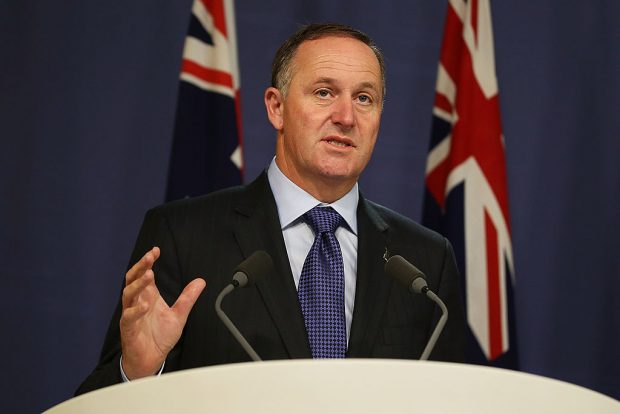Imagine a Tory Prime Minister stepping down after nearly ten years at the top on his own terms. The budget was back in surplus, troublesome referendum results had been quickly forgotten, and the PM still remained overwhelmingly popular, with his party still sitting on around 50 per cent in the polls. No, it’s not the restless dreams of David Cameron, but John Key – New Zealand’s soon-to-be ex-PM, who unexpectedly announced his resignation earlier today.
Arguably one of the most successful centre-right leaders in the world since Margaret Thatcher, Key has dominated New Zealand politics for the past decade. His National party has held near-majority government, despite a proportional electoral system that was meant to make such a situation impossible. And his departure has given Labour (currently, believe it or not, polling worse than its British sister party) a sliver of hope – Andrew Little, the sixth opposition leader to be thrown into the amphitheatre to face Key, looked visibly relieved heaping praise on the man who’d devoured his predecessors.
Yet for his electoral success, there isn’t much that screams ‘legacy’ about Key’s time in office. And there’s certainly nothing that makes him worthy of mention in the same sentence as Reagan, Thatcher, Kohl, or even Blair. Key’s triumph has been playing the hand fate dealt exceptionally well. He’s delivered stable, business-friendly government against a backdrop of the global credit crunch, and he ran deficits to shield New Zealand, a country heavily reliant on international trade, from the worst of the economic slowdown. There’s been massive investment in transport infrastructure, welfare has been reformed, and the hard work of getting Christchurch back on its feet after the 2011 earthquake is underway – imagine demolishing the bulk of Central London and you get a sense of the task’s enormity.
Key’s goofy moments – memorably pulling a waitress’s pony tail – sent the left into meltdown, but my gut feeling is his ‘awkward uncle‘ antics quietly endeared him to the majority of New Zealanders. He’s the son of a single mother who grew up in a council flat, married his childhood sweetheart and became a self-made millionaire, yet enjoys popularity comparable to pre-Brexit Boris.
So why step down when he’s on top, with another term beckoning? Key, aged 55, said he had ‘left nothing in the tank’; he’s a workaholic, not a chillaxer, and three decades of punishing work hours as one of Merrill Lynch’s top currency traders and at the top of politics are enough. He’s served his country, and he’s estimated to be worth £33 million – and he wants to spend time with the family he’s clearly devoted to, judging by the social media insights from his now celebrity children. Key says his decision to step down was made in September, and as his helicopter swooped over the shattered roads and railway tracks on his way to visit communities hit by last month’s 7.8 earthquake, I wouldn’t blame him if he quietly felt relieved knowing someone else was going to shoulder responsibility for the rebuild.
The big shake almost certainly delayed his resignation announcement until today. New Zealand’s three-year parliamentary terms means resigning before Christmas gives his successor a clear run into the general election. Key said he’d ‘taken the knife to myself to allow others to come through‘, but the 19 MPs elected by list will need refreshing too – a messy job more easily accomplished by a new leader. There will be some nervous members in the National caucus, keenly trying to ensure they back the right horse in next week’s leadership ballot.
And for all the sense that New Zealand is doing well, with the government back to running a surplus, there remain some big challenges that Key has avoided tackling. Auckland’s dysfunctional housing market is beginning to make London look good value. The pension age remains unsustainably low at 65. Immigration levels are increasingly worrying some of the National Party’s base. And while Key’s government signed free-trade deals with Malaysia, Taiwan and Hong Kong, years of work on the Trans-Pacific Partnership went up in flames after Donald Trump’s election. Salvaging something from the wreckage will be a priority for the next Prime Minister.
The failure of the TPP talks ranks second to Key’s biggest regret – failing to persuade New Zealanders to ditch our Union Jack-based flag in a £12m vote. But in the scheme of things, it’s hardly like the disastrous decision to invade Iraq, or making the wrong call in a Brexit referendum. Perhaps Key’s legacy isn’t so bad after all.
Matthew Plummer’s other writing for The Spectator can be found here.





Comments